Talent Management Systems
The ultimate platform for talent management
Our comprehensive software suite empowers you to cultivate talent management systems for developing company talent at every level.
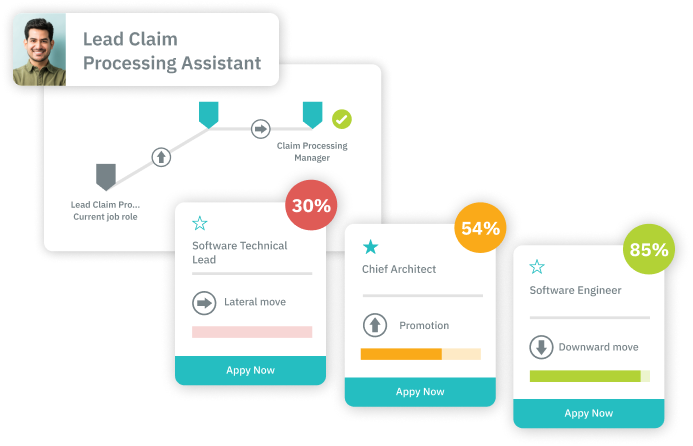
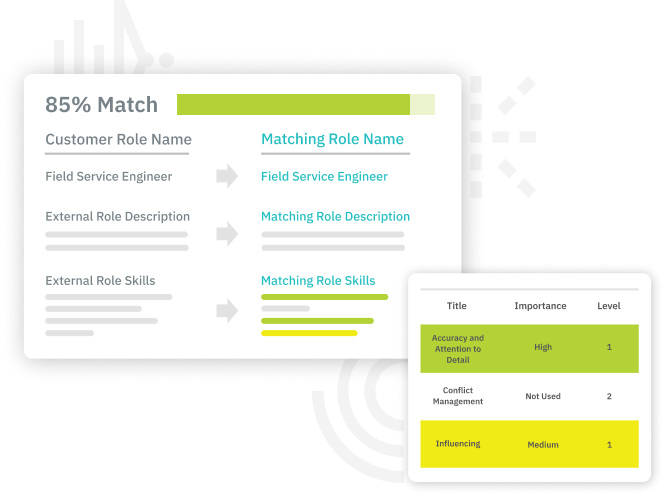
Fast & easy build-out with AI
We help you rapidly augment your job role data with skills and proficiencies (if you want them), so everyone is on the same page about the expectations of each role, the skills it requires, and how it interacts with other roles in the company.
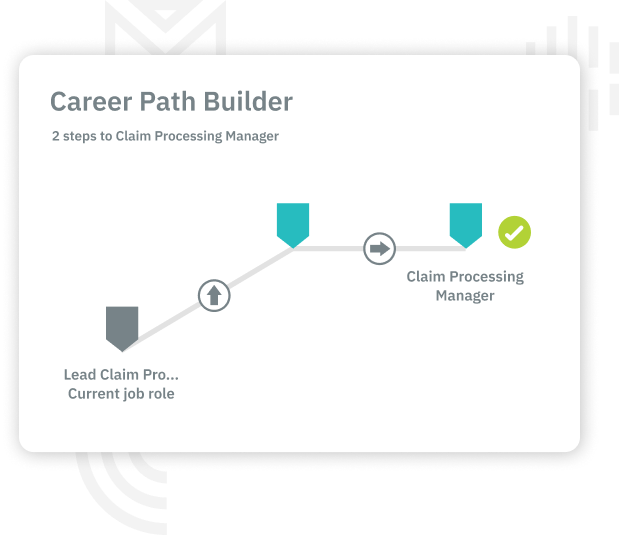
Visibility that sparks initiative
Employees can actively explore their possibilities within the company and build career paths tailored to their competencies and goals, whether they’re aiming for the top or happy where they are.
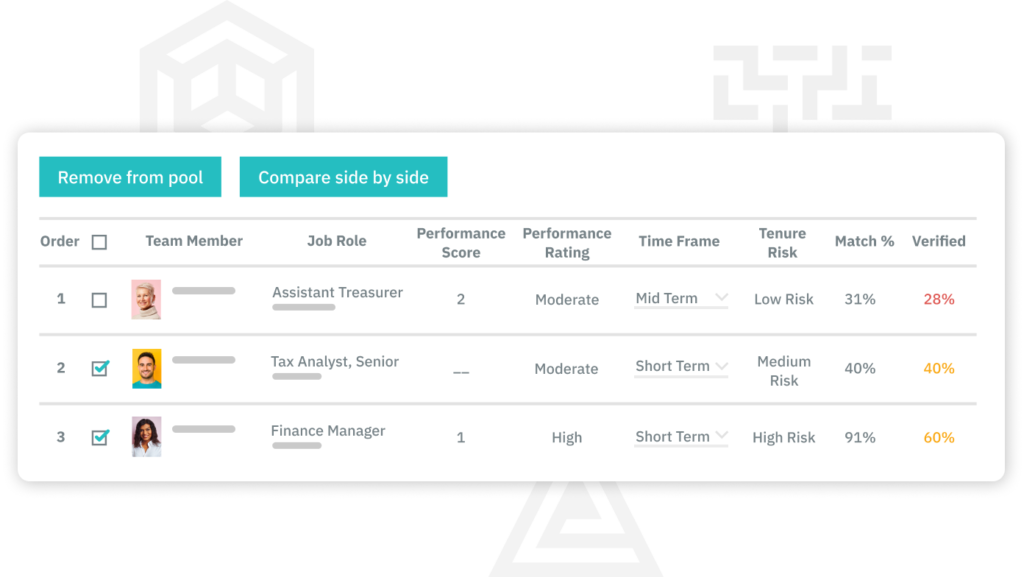
A clear view of future needs
Enable managers to see their teams’ bench strengths, tenure risks, and gaps in role succession so they can develop their people with an eye to the future.
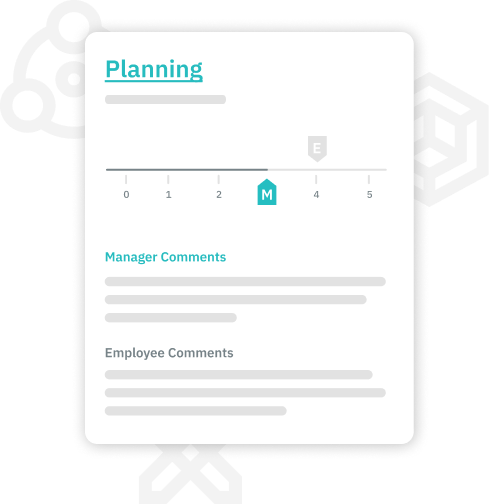
Real-time feedback for better learning
Performance feedback is most powerful when it happens in real time, whether it’s constructive criticism or recognition for a job well done. The performance review can be transparent between manager and employee or employee-only, or manager-only.
A talent strategy that grows with you. Select a bundle to book a demo!
Foundation
Foundation includes:
- Intelligent Role Studio
- Job and Skill Libraries
- Basic Reporting
- API
Basic
All the Foundation features plus:
- Talent Assessment
- Development Planning
- Reporting & Analytics
- 30+ languages
Core
All the Basic features plus:
- Career Pathing
- Certification Tracking
- 60+ languages
Pro
All the Core features plus:
- Succession Planning
- Performance Management
- 360 Feedback
- Advanced Reporting & Analytics
- 90+ languages
Trusted by:




Your workforce is changing. Never be unprepared again.
Read our eBook
Additional information
When the average person considers a phrase like talent management, they are likely imagining some form of talent acquisition or recruitment system. In reality, talent management practices can vary widely to encompass a broad range of applications. Talent management systems can generally be categorized into a handful of distinct categories like training, eLearning, recruitment, employee engagement, and performance management/assessment.
Typically, the objectives of talent management are similar across several different industries or marketplaces. Previous generations could feasibly expect to remain with their company for decades until retirement. Since the explosion of technological advancements in the digital era, employment possibilities and opportunities have also increased – seemingly exponentially. As labor markets grow ever more complex and competitive for skilled laborers, companies are having to adapt by providing employees with internal advancement opportunities and other incentives.
In order to improve an organization’s talent management program, it can be helpful to make a baseline assessment of the current talent management process in place. TalentGuard’s main points of focus are to assess employees’ current skill and proficiency levels, help train and further develop those employee skills, and catalog their skill data to better understand and determine successful career paths and succession proposals so that managers and employees alike remain in alignment with growth and achievement goals.
TalentGuard provides organizations with the expertise and tools necessary to help companies reinvest in their most valuable resource – their employees. For companies looking to grow or improve revenue streams, reskilling or upskilling existing employees is a relatively quick and efficient process, especially when compared to all of the time, labor, and resources that must be spent recruiting new talent and training new hires.
Adequate talent management systems can also ensure that your workforce is trained or certified in all the necessary compliance regulations within your industry. Additionally, proper talent management can also help ensure that companies retain an atmosphere of diversity and inclusivity.
If your organization has previously struggled with talent acquisition and retention, or if your business is simply looking to modernize its talent management systems, TalentGuard provides thorough and comprehensive solutions to help your business achieve its goals. With highly capable software that utilizes artificial intelligence, TalentGuard makes identifying and developing your employees’ skills and proficiencies a priority. This can help increase employee productivity while improving the quality of their work. Additionally, a robust talent management system can help identify skills your employees possess that you might not have even been aware of.
Why Is Talent Management Important?
Every company engages in some form of talent management – even small businesses with only one or two employees, but exactly why is talent management important? It may seem like an unnecessary expense, especially if your operational budget is already fairly lean. However, investing in your company’s talent management is akin to an individual scheduling regular doctor appointments in order to ensure that there are no ongoing or developing health issues. In this analogy, investing in sufficient talent management resources is similar to providing a regular “health” check-up for your organization. Does your company have the employees with the talent and skills necessary to achieve your business’s long- and short-term goals? If not, are there ways you can support your workforce to ensure that they can develop those skills as your company meets its goals?
The best talent management companies understand this as well as anyone. When it comes to developing a sound and effective talent management strategy – whether you’re utilizing a talent management suite or consulting a talent management firm – it’s important to understand that successful talent management can greatly impact the bottom-line success and longevity of your organization.
Once your organization has successfully identified a talent management approach that makes sense for your specific applications, you can begin to make employee-focused adjustments to help satisfy their needs as well as the overall needs of the business. Developing a symbiotic relationship in this manner ensures that employees can feel respected and cared for while making strides toward achieving their business goals. Whether your company is looking to grow, branch out into a new market, or simply improve revenue streams – investing in proper talent management resources is a kind of foundational approach that can have lasting beneficial impacts.
Talent Management System Examples
With so many different and valuable talent management approaches, it can be difficult to decide which is best suited for your organization. Identifying the most effective talent management system to help your company retain talented employees and provide opportunities for employees to develop additional skills or enhance skills they already possess is one of the most valuable investments an organization can make.
Some talent management system examples might include the ability to execute baseline assessments and install continual tracking guidelines to help provide managers and supervisors with valuable insights. In other words, a talent management system could potentially provide information about employees about which of their skills could be developed further as well as identify other unknown skills that could be utilized more effectively. Employees provide much more to companies than what might comprise their daily tasks; a smart talent management approach will help identify other skills or proficiencies that an employee brings to the table and can offer a path forward that helps grow existing skills while potentially providing career advancement opportunities among other beneficial aspects for companies and their workforces.
Other talent management program examples likely involve leadership evaluation and an assessment of existing succession plans and identifying potential areas for improvement. In some cases, especially for smaller or medium-sized enterprises, a company may not even have a succession plan. A succession plan can help readily identify any potential gaps in labor skills and ultimately prepare your business for the future so that you are prepared for any eventuality.
Assessing your employees’ skills and proficiencies can also help recognize potential future leaders based on attributes like potential, performance, and preparedness. A good talent management system would then provide opportunities for these individuals to improve their existing skills as well as the opportunity to garner additional skills which may be helpful or required for a leadership position. These prospects could also team up with current leadership in a mentor-mentee capacity to help solidify the transfer of valuable knowledge and skills, thereby ensuring the success and longevity of your organization.
Talent Management Tools
With so many viable methods of talent management, there are similarly a wide array of talent management tools that companies make use of in order to actualize their talent management strategy. By working closely with your employees, you can better understand their wants and needs, both in terms of their career goals but also in terms of day-to-day activities.
The best talent management companies utilize talent development software to discover and achieve talent management solutions. Some of these tools exist to improve current communication and collaboration endeavors; some tools can help with the documentation of important tasks and maximize efficiency across each of your organization’s departments.
Some talent management system features may include the ability to track and assess active recruitment initiatives, performance assessment and management, as well as compensatory management and learning or skill-development handling. A good talent management system will provide your organization with valuable insights about ways in which you can improve the lives of your employees while also strengthening their capabilities and, ultimately, the capabilities of your company’s performance.
TalentGuard provides a comprehensive software platform that empowers companies to cultivate talent and new skills at every level of their organization – from the development of your current employees to planning for contingencies and other potentialities. By relying on AI-informed software, TalentGuard helps accelerate your talent management initiatives by providing in-depth information about employee proficiencies, qualifications, experiences, certifications, and even work-style predilection. With just a single glance, your company can obtain all the necessary information to make intelligent human resources development decisions to improve employee satisfaction as well as improve your company’s overall capabilities.
The Best Talent Management Systems
While there may not be one single top talent management software because every company is different and has different talent management goals, the best talent management systems make use of systems like competency management, for instance. When you define your standards and benchmarks, you can paint a much more accurate picture of baseline operations as you gear up to make decisions and determine your company’s primary objectives for the future.
Instead of spending countless hours determining hiring committees or working with an outside recruitment or staffing agency, your organization can work to nurture the talent your employees already possess. Businesses, like many earthly entities, must continually evolve and adapt in order to thrive in ever-changing marketplaces. Change can be frightening, for sure, but using a talent management system can help your organization and employees prepare for those potentially frightening yet necessary changes to help your company survive and flourish as others struggle to adapt.
Developing your employees’ existing skills and identifying new skills within your workforce is a straightforward and effective way to optimize the ecosystem within your organization without having to worry about turnover, all while your business grows and achieves the objectives you set out to accomplish.

